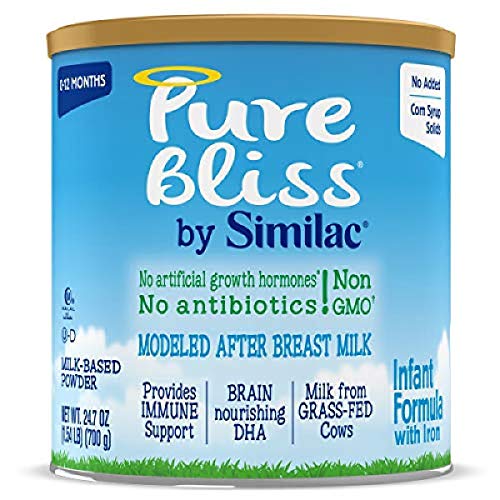Searching for baby formula can get downright confusing if you don’t know what you are looking for. In this article, we are comparing the ever-popular Similac Pro Advance vs Pro Sensitive to help you understand the key differences between the two. Similac offers formulas that will be gentle on your baby’s sensitive tummy and can ensure your child is drinking only the best quality, we’re sure you’ll love at least one of these options from Similac.
So, if you’re ready, let’s dive into the details.

What Is the Difference Between Pro Advance and Pro-Sensitive?
There are many differences between Similac Pro Advance and Pro Sensitive. The main difference between the two is that one is used for babies with sensitive tummies and the other is not. But which is which? Let’s take a closer look at each type of formula to get a better understanding of what each one claims.
What Is Similac Pro Advance Used For?
Similac Pro Advance can be thought of as the creme de la creme of baby formulas. It is made up of non-GMO ingredients. This means that none of the ingredients used in making the formula have been artificially manufactured or derived. No growth hormones are used in the production of this baby milk because only non-rBST cow’s milk is used. It is also fortified with DHA, lutein, and Vitamin E for immune-boosting benefits.
One of the most talked about benefits of using Similac Pro Advance is the use of 2’-FL oligosaccharides. Oligosaccharides, also known as human milk oligosaccharides (HMO), are found naturally in breast milk and work to support your baby’s immune system. Similac has found a way to mimic oligosaccharides in a lab.
Even so, some studies show that the oligosaccharides found in baby formula do not mimic the same benefits that they do in breast milk. Still other studies seem to contradict these reports stating that synthetically created oligosaccharides do indeed provide benefits to infant health. Obviously, more research is needed to come to a proper conclusion about the use of HMO.
In any event, Similac Advanced Pro is typically touted as the ultimate infant formula because of its complex and innovative formula composition. Still, the price tag reflects all of the research that has been poured into this baby beverage. As a result, some parents may find this option a bit too steep in terms of pricing to use on a continual basis.
What is Similac Pro-Sensitive Used For?
Similac Pro Sensitive is most often used for babies with delicate tummies due to lactose sensitivity. This isn’t to say that all lactose has been removed from the formula. But most of it has.
It is important to note that though Similac Pro Sensitive is designed for babies that are lactose-intolerant, it doesn’t mean your baby won’t react negatively to this formula. Similac Pro Sensitive may still irritate the stomachs of babies who cannot tolerate whey or casein. These are two proteins found in milk that can cause digestive issues in young babies.
Similac makes it clear that Pro Sensitive does contain milk but that it is formulated with less lactose than other types of Similac formula. How much lactose is in the formula is not specifically stated on the website of the manufacturer.
Similar to Similac Pro Advance, Similac Pro Sensitive also checks out in terms of high quality and nutritional ingredients added. This includes immune system supporting DHA, lutein, and Vitamin E, and also the oligosaccharides mentioned earlier. The main area in which Similac Pro Advance and Similac Pro Sensitive differ is in their milk-based ingredients.
Similac Pro Advance vs Pro Sensitive Ingredients
The most striking differences between both Similac Pro Advance and Pro Sensitive come down to claims made and actual ingredients.
Similac Pro Advance makes no claims to assist babies that deal with fussiness, gas, or crying. Still, because of its high-quality ingredients, doctors often recommend parents try Similac Pro Advance to help ease issues with constipation.
If, however, your baby struggles with gas and fussiness due to lactose intolerance, he or she will need to try a formula with lower lactose content. This is where Similac Pro Sensitive comes into play. Though not for every baby, Similac Pro Sensitive can be easier on the stomach for babies who cannot tolerate Similac Pro Advance formula.
Let’s take a look at the ingredients of Similac Pro Advance and Pro Sensitive to get a better idea of how their ingredients differ.
Ingredients in Similac Pro Advance
Nonfat Milk, Lactose, High Oleic Safflower Oil, Whey Protein Concentrate, Soy Oil, Coconut Oil. Less than 2% of: Schizochytrium Sp. Oil, M. Alpina Oil, 2′-Fucosyllactose, Short-chain Fructooligosaccharides, Beta-Carotene, Lutein, Potassium Citrate, Calcium Carbonate, Ascorbic Acid, Soy Lecithin, Potassium Chloride, Magnesium Chloride, Ferrous Sulfate, Choline Bitartrate, Choline Chloride, Ascorbyl Palmitate, Salt, Taurine, Inositol, Zinc Sulfate, Mixed Tocopherols, d-Alpha-Tocopheryl Acetate, Niacinamide, Calcium Pantothenate, L-Carnitine, Vitamin A Palmitate, Copper Sulfate, Thiamine Hydrochloride, Riboflavin, Pyridoxine Hydrochloride, Folic Acid, Manganese Sulfate, Phylloquinone, Biotin, Sodium Selenate, Vitamin D3, Vitamin B12, Calcium Phosphate, Potassium Phosphate, Potassium Iodide, Potassium Hydroxide, and Nucleotides (Adenosine 5′-Monophosphate, Cytidine 5′-Monophosphate, Disodium Guanosine 5′-Monophosphate, Disodium Uridine 5′-Monophosphate)
Ingredients in Similac Pro Sensitive
Corn Syrup, Milk Protein Isolate, High Oleic Safflower Oil, Sugar, Soy Oil, Coconut Oil. Less than 2% of: C. Cohnii Oil, M. Alpina Oil, 2′-Fucosyllactose, Short-chain Fructooligosaccharides, Beta-Carotene, Lutein, Potassium Chloride, Sodium Citrate, Calcium Phosphate, Potassium Citrate, Soy Lecithin, Inositol, Magnesium Phosphate, Ascorbic Acid, Choline Chloride, Ascorbyl Palmitate, Ferrous Sulfate, Choline Bitartrate, Taurine, Calcium Carbonate, Zinc Sulfate, L-Carnitine, Mixed Tocopherols, Niacinamide, d-Alpha-Tocopheryl Acetate, Calcium Pantothenate, Magnesium Chloride, Vitamin A Palmitate, Copper Sulfate, Thiamine Hydrochloride, Riboflavin, Pyridoxine Hydrochloride, Folic Acid, Potassium Iodide, Manganese Sulfate, Phylloquinone, Biotin, Sodium Selenate, Vitamin D3, Vitamin B12, Potassium Hydroxide, and Nucleotides (Adenosine 5’-Monophosphate, Cytidine 5’-Monophosphate, Disodium Guanosine 5’-Monophosphate, Disodium Uridine 5’-Monophosphate)
Ingredient Comparison: Similac Pro Advance vs Pro Sensitive
As you can see, the first few ingredients in both formulas are very different from one another.
Similac Pro Advance is formulated with lactose and milk as the first two ingredients. Similac Pro Sensitive, however, lists corn syrup and milk protein isolate first. So, what is milk protein isolate anyway?
As its name would suggest, milk protein isolate is a protein found in skim milk. It is filtered heavily and broken down to remove most of the lactose. The result? What is left behind is almost 90% protein. These proteins, as already pointed out, are casein and whey. Both of these compounds can be difficult to digest which is why your baby still may have tummy issues despite having switched to Pro Sensitive.
Similac Pro Advance vs Pro Sensitive: Which Is Best For My Baby?
When trying to discover whether Similac Pro Advance or Pro Sensitive will be best for your baby we will need to take several factors into account.
Your Baby’s Sensitivities
One of the most defining factors in determining whether or not your baby should take Pro Advance or Pro Sensitive is his or her sensitivities. If your baby does not seem to be experiencing any issues related to gas, discomfort, or fussiness you may wish to give Pro Advance a try.
If, on the other hand, your baby seems highly uncomfortable with the formula you currently use, you may wish to try Similac Pro Sensitive. It could be that your baby is sensitive to the use of milk and lactose in normal formulas and may need something a bit gentler on the tummy.
Remember that though Similac Pro Sensitive is formulated for those with lactose intolerance, this does not mean that every baby will respond well to it. If you find that your baby doesn’t do well with Pro sensitive, you may wish to give Similac Total Comfort a try instead . Both Pro Sensitive and Pro Total Comfort* are similar, however, Total Comfort doesn’t have the casein that Pro Sensitive does. This makes it a good choice for even the most delicate of tiny tummies.
Your Doctor’s Advice
When choosing the right formula for your kiddo your doctor’s advice is extremely important. Do not downplay your doctor’s role! Remember that it is your doctor who can help you determine whether or not your baby has a milk or lactose allergy and can recommend a formula best suited for your baby.
Without your doctor’s advice, you may be tempted to switch formulas until you find “the right one”. Unfortunately, during the process, you could end up unintentionally causing your baby much pain and discomfort. Rather than experiment with your little one, try keeping a journal of any of your baby’s negative symptoms after drinking their current formula. Present this information to your doctor. Your doctor may perform tests to see if your baby has any allergies and will then inform you on what to do next.

Your Personal Preference
As you already know, it is important that if your baby has difficulty digesting milk you avoid feeding him or her regular formula. But if your baby has no sensitivities that you are aware of, whether or not you choose to use Similac Pro Advance comes down to personal preference.
As mentioned before, Similac Pro Advance is often preferred because of its non-GMO ingredients and the addition of 2’-FL oligosaccharides. The oligosaccharides are assumed to add benefits to infant formula similar to the benefits that breast milk would bring. Still, Similac Pro Advance is can be quite expensive, and thus, may simply not be an option for some families.
In either event, it is important that you weigh your options. Choose the formula that works best for you and your baby. Yes, Similac Pro Advance comes with high-quality non-GMO ingredients, so naturally, it is the better choice. But be sure to do your research. Seek out other brands and formula types that may provide other benefits as well.
As always, if you need further help or guidance, be sure to reach out to your child’s pediatrician.

Switching From Pro Sensitive to Pro Advance: Should I Do It?
With the information just provided, you may be wondering if you should make the switch from Pro Sensitive formula to Pro Advance. If you wish to do this, be sure that your baby ISN’T sensitive to milk and lactose. This is crucial as Pro Sensitive doesn’t contain nearly as much lactose as Pro Advance. Therefore, it is imperative that you know whether or not these sensitivities exist before you make the switch.
Not sure if your baby has a sensitivity to lactose? Go ahead and buy one Pro Advance canister and give it a try. When you do, monitor your baby closely to note signs of discomfort.
If your baby becomes fussier, gassier, or becomes constipated, these may be signs that your child isn’t tolerating the Pro Advance well. It may also be an indicator of lactose intolerance, but not necessarily so. Some infants simply do better with some formulas than others. To know for sure, contact your baby’s doctor for more details.
Similac Pro Advance vs Pro Sensitive: The Differences Are Crucial
When it comes to Similac Pro Advance and Pro Sensitive the differences are crucial. Although both contain coveted oligosaccharides, non-GMO ingredients, and other immune-boosting components, the two are very different.
Remember that Similac Pro Advance works well as a high-end replacement for “regular” formula. Similac Pro Sensitive, however, is specially designed for lactose-intolerant babies. As such, you should consider making the switch to Pro Sensitive if you and your doctor suspect that your baby may be reacting to the lactose in his or her regular formula milk.
Keep in mind that switching to Pro Sensitive may not cure all of your baby’s stomach woes. If your baby is particularly sensitive to milk proteins, try giving Similac Total Comfort a go instead.
Until next time!
FAQs
A baby displaying signs of discomfort after feedings may need to switch to a sensitive formula. Symptoms of discomfort include gas, constipation, and fussiness.
Similac Pro Sensitive may be thicker due to its ingredient and compositional makeup.
“Pro” Similac usually refers to the addition of oligosaccharides and non-GMO ingredients in the formula as compared to non-Pro varieties.
Pro Sensitive isn’t completely lactose-free, however, it is very low in lactose when compared to “regular” formula.
If your baby doesn’t have a milk allergy or is not lactose intolerant then they may tolerate Pro Advance better than typical formula. Many doctors recommend Pro Advance for babies that are constipated or aren’t tolerating formula well. However, it isn’t recommended for those suffering from lactose sensitivities. If your baby doesn’t have a milk allergy or is not lactose intolerant then they may tolerate Pro Advance better than typical formula. Many doctors recommend Pro Advance for babies that are constipated or aren’t tolerating formula well. However, it isn’t recommended for those suffering from lactose sensitivities.



Leave a Reply